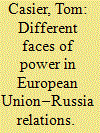| Srl | Item |
| 1 |
ID:
157800


|
|
|
|
|
| Summary/Abstract |
This article applies Barnett and Duvall’s taxonomy of power to European Union (EU)–Russia relations aiming to understand power in its complexity and without a priori theoretical assumptions. Four different types of power – compulsory, institutional, structural and productive – feature simultaneously. It is argued that non-compulsory forms of power are key to understanding the logic of competition in EU–Russia relations in the decade preceding the 2014 Ukraine crisis, despite receiving limited scholarly attention. First, a struggle over institutional power, the capacity to control the conditions of the other actor indirectly, appeared from rivalling integration projects and competing norm diffusion. Secondly, power relations were strongly characterised by constitutive forms of power – structural and productive – in particular the capacity to produce and recognise identities, such as Europeanness. In both fields, the EU held a hegemonic position, which Russia increasingly challenged. The geopolitical reading of the change in regime in Ukraine in 2014 prompted Moscow to a radical change of strategy, by shifting the emphasis in the confrontation to compulsory power. Attempts at direct control, from annexation to sanctions, now dominate relations. Where Russia seeks to prevent the Euro-Atlantic community from gaining effective control over Ukraine through destabilisation, this can be labelled ‘negative’ compulsory power.
|
|
|
|
|
|
|
|
|
|
|
|
|
|
|
|
| 2 |
ID:
098789


|
|
|
|
|
| Publication |
2010.
|
| Summary/Abstract |
European Union (EU)-Asia relations raise linked problems (on the one hand) of EU collective action and identity and (on the other hand) of cooperation. The relationship is characterized by complexity and variety in three dimensions: first, 'voices' and history; second, institutional engagement and structure; and third, issue structure. In order to explore the implications of this complexity and variety, and to generate propositions for further research, we deploy International Relations theories based on material interests, ideas and institutions. These help us to demonstrate not only the application of 'analytical theory' but also the role of 'practitioner theory' in the evolution of relations between the EU and Asia, and thus to reflect systematically on the problems of collective action and cooperation identified at the beginning of the article.
|
|
|
|
|
|
|
|
|
|
|
|
|
|
|
|